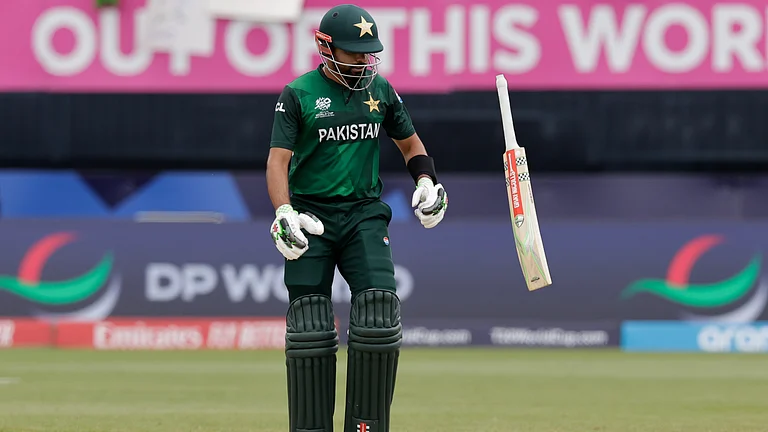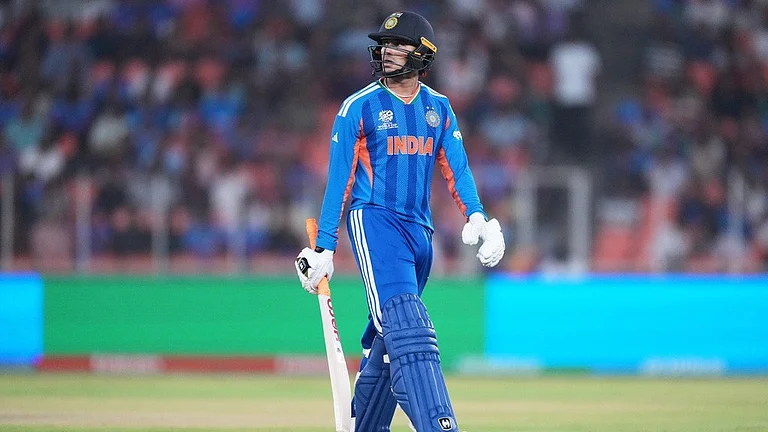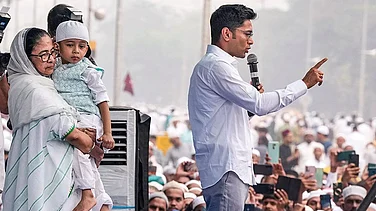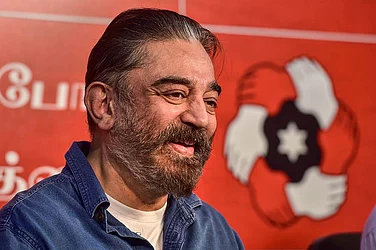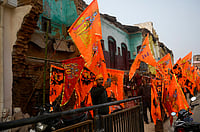Following the brutal killing of Australian missionary Graham Staines and his children in February, came a fresh outburst at Ranalai village, 18 km from Ramgiri-Udaygiri in Orissa's Gajapati district. On March 8, enraged tribals torched over a hundred houses and wounded four Christians of the Pana community. The immediate provocation for the clash: a trishul drawn over an old cross painted on the neighbouring Khamari hillside.
The 'desecration' created resentment among the Christians. However, the two communities decided to settle the matter among themselves and a peace committee was formed with six members of both communities agreeing to restore the cross. This was done. But a few days later the trishul reappeared on it.
A larger peace committee was constituted by the local administration. And amity was seemingly restored. Not for long, however. A group of villagers gathered, this time to erase the cross. On their way back, they were waylaid by angry Christians. An altercation ensued and one person of the group was injured. As the news spread, a 1,000-strong crowd of irate non-Christians tribals gathered on the hillside and descended on Ranalai from three sides, burning houses, firing arrows and home-made pistols. The four policemen deployed in the village were no match for the mob.
The Gajapati and Parlakhmendi districts have had a history of tension between the tribals and the Panas, a scheduled caste community. But earlier, there had never been any major communal tension between them. Most of the neo-converts to Christianity are from among the Panas and the tribals resent their relative prosperity. They own land and are moneylenders. The illiterate tribals, according to the local people, are now being instigated by Hindu fundamentalists who have gained a hold in the area. While not long ago the tribals would not agree that they were Hindus, now they proclaim with a vengeance that they are. The vhp activism in the area has obviously exaggerated the tribal-Pana divide.
Consequently, communal incidents are now on the rise. Director general of police Dilip Mohapatra and chief minister Giridhar Gomango have stated that fundamentalist forces are not responsible for the latest round of communal clashes. However, a fact-finding team from the state assembly found a saffron hand behind similar clashes that took place on December 8 last year, when a mob had gone on the rampage in the town of Udaygiri, breaking into the local jail and killing two inmates. One of the undertrials was a Christian accused of extortion. As the riot continued, over 100 houses and a nearby church were burnt down. Days later, a number of houses in the Christianpada were gutted.
The situation has snowballed into a crisis with the Ranalai incident. The Opposition is up in arms, blaming the government for not having implemented the recommendations of the house committee that had investigated the December clash.Gomango rushed to the spot to take stock of the situation and issue conciliatory statements. And the state government has now appointed Kishore Chandra Jagdev Ray, retired chief justice of the Orissa High Court, to a one-man probe commission.
Significant developments took place in Delhi too. Supreme Court sitting judge D.P. Wadhwa, who heads the commission of inquiry into the Staines killing, lashed out at the Central government for not providing him with the basic infrastructure to carry on the probe, even after one of the two months stipulated for the completion of the inquiry had lapsed. At the first sitting of the commission, organised at his official residence, Wadhwa virtually gave the government a week-long deadline to mend its ways. A chastened home ministry obliged.
The work of the commission will be interesting. The team has toured Manoharpur in Orissa and prepared a preliminary report on the incident. Notices have been sent to 21 individuals, including district authorities, Staines' widow, villagers and others, all of whom have been asked to file detailed reports on what happened-this will constitute crucial evidence before the commission.
What do the preliminary findings suggest? Says secretary of the commission, D.G.R. Patnaik, a special judge who had conducted a successful probe into communal violence in Bihar in 1992: "We have read enough media reports. All that people said publicly has to be now said before the commission. Only then does it have any substance. We are not going by any preconceived theories as to who was involved in the killing."
While the judicial investigation takes its own pace, the rss has no doubts about its stand. At a three-day convention in Lucknow, rss joint general secretary K.C. Sudershan was outspoken. According to the rss, the percentage of Christians in India is over 5 per cent and not 2.5 per cent; that the 2.5 per cent who are not on record are 'crypto Christians'; this group, the rss claims, consists of members of schedule tribes and castes who have been converted by missionaries, but have been advised to retain their Hindu identity so that they can enjoy sc/st benefits. Declared Sudershan: "The rss is collecting data on this and very soon we will expose the conspiracy."
Besides doling out a blow-by-blow account of an "international conspiracy to dislodge the bjp government" and "defame the Sangh family", the rss propaganda machinery is set to go all out on the conversion issue. A strongly-drafted resolution was circulated in Hindi and English, along with the Conspiracy of Church, a coloured booklet detailing how the Sangh's various wings, specially the vhp and Bajrang Dal, were being dragged into the mud by rival political parties. With the assembly polls less than a year away, it's the bjp which stands to gain from the communal polarisation.
But the bottomline is this: if the government takes the rss stand on conversions seriously, it could mean only more insecurity for the minorities, increased scope for conflict, and a tragic diversion of focus and resources from pressing economic concerns.




